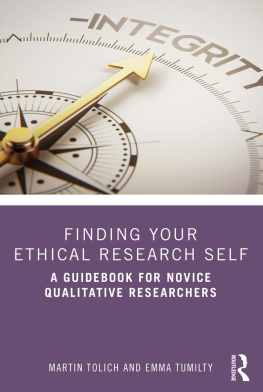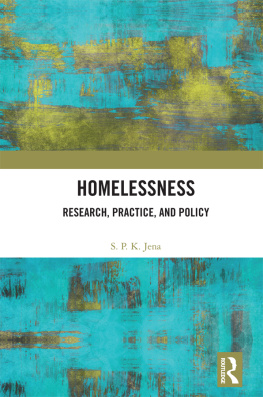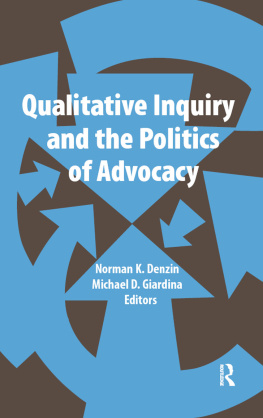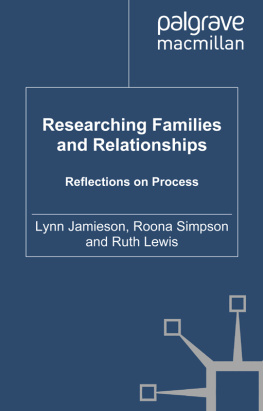Conclusion
Synthesizing the Personal and Professional: A Systematic Consideration of Ethics and Advocacy in Social Science Research
Trenna Valado
The issues raised in this collection range from the most basic areas of self-presentation and the representation of research participants to ones that shake the very foundations of the research endeavor. Should we be doing this? Are we exploiting people for our own gain? If we realize that we cannot affect meaningful change in the structural factors that underlie homelessness, is it ethical to continue to do research on the topic? On the other hand, is it ethical to stop? Does research imply a promise of possible change to participants that we cannot fulfill? Should researchers become advocates, and if so, what should we advocate for?
We started this volume with broad questions about what the ethical issues were in research on homelessness and the role of advocacy in such research. It turns out that research is rife with ethical issues and that all of the contributors to this volumefrom relative neophytes to those with decades of experiencecontinually struggle with how to handle these issues and what role advocacy should play in their work. The issues in this book are not unique to the study of homelessness. Just as the contributors represent a wide array of disciplinesanthropology, geography, political science, sociology, urban studiestheir insights are applicable to various areas of inquiry, especially those that involve research with or about marginalized and vulnerable populations. The insights also span all stages of the research process, from conceptualization to implementation and dissemination.
Also notable are the myriad professional histories, methods, and research foci that the contributors bring to their work. Many worked in direct service provision before, during, or after their research. Most are currently involved in academia, while one currently works in the private sector evaluating social service programs. The contributors have conducted research in a range of settings (e.g., shelters, public parks, activist enclaves) and with varied groups (e.g., homeless individuals, social service workers, government employees, business people, advocacy groups). The topics they have explored include the transformation and use of public space, the effectiveness of specific service interventions, the relationships among and between social service workers and homeless people, and public perceptions of homelessness. Some of the contributors are actively engaged in advocacy and activism, whereas others question the utility of these practices.
Despite varied backgrounds and research agendas, the contributors to this volume are all unified by a common desire and willingness to write honestly about the ethical dilemmas they have faced in conducting research on homelessness. This is not an easy task, in part because this sort of self-reflexivity is often not encouraged or rewarded. Yet by discussing the varied professional and personal dilemmas confronted during the course of their research, the contributors highlight several themes that span academic disciplines and may inform the efforts of other scholars. These themes include such issues as the need to study up, the balance between advocacy and efficacy, how to manage field relationships, and the underlying purpose of research on entrenched social problems. In reviewing these and other issues, it becomes apparent that researchers can strengthen their work by more openly discussing ethics and advocacy concerns and by systematically addressing these topics throughout the research process. The following section builds on the contributors insights by providing a frame-work to encourage continued dialogue and to guide future researchers across disciplines in thinking more systematically about ethics and advocacy in their own work.
A Systematic Consideration of Ethics and Advocacy
Issues of ethics and advocacy are endemic to social science research, yet they are rarely discussed in much depth in the scholarly literature. This is somewhat ironic, because they are common topics of verbal discussion and debate among researchers. While such informal exchanges are undoubtedly useful in helping scholars sort through the dilemmas raised during their research, there is also a need for more formal guidance and a shared framework for bringing these issues to the fore. This section seeks to offer some guidance by presenting an operational framework that scholars can use to systematically consider issues of ethics and advocacy before, during, and after their research. To do this, we have divided the research process into three broad stages: conceptualization, implementation, and dissemination. For each stage, we pose a series of who, what, when, where, why, and how questions that may aid researchers in thinking through some of the issues they are likely to confront in their work.
The following questions are certainly not exhaustive or exclusive, and dividing them into stages is purely instrumental. In reality, there are no clear boundaries between the myriad issues raised, just as there are no clear boundaries between stages of the research process. Research is iterative and organic, with each aspect informing and shaping the others. The questions posed are not intended as an end point, but rather as the beginning to more in-depth consideration of ethics and advocacy issues. As such, each question will likely raise even more questions. Ultimately, the answers to all the questions are deeply personal; there is no definitive right or wrong, and each individual must reach his or her own decisions about how to conduct research. But thoughtfully and thoroughly answering these questions (and others that flow from them) may help researchers minimize unforeseen dilemmas and be better prepared for those that are unavoidable.
Conceptualization
The research process obviously begins long before scholars conduct interviews, make observations in the field, or even start combing through the existing literature on a subject. The first steps in any research endeavor are the identification of a topic of study and the determination of how best to go about exploring the chosen topic. This planning stage often includes the sometimes tedious activities of obtaining grant funding, applying for approval by an Institutional Review Board (IRB), and beginning to obtain various permissions to conduct research in certain locations. While this may not be the most glamorous part of the research process, it is one that is filled with ethical considerations that ultimately shape every facet of the ensuing work. As such, it is imperative to carefully consider the motivations underlying the proposed research as well as its potential impacts. Answering the following interrelated questions may help begin this process of deliberation.
Who should my research focus on? Although much research on homelessness involves direct study of homeless people in various contexts, several contributors question the efficacy and ethics of this approach. The underlying issue is largely one of whether to study down or study up. Doing research on homeless peoples lives and experiences may serve to give voice to a population that is highly marginalized, but studying other, more powerful groups that actually have the ability to shape policy may be more effective in bringing about changes in the structural causes of homelessness. Wright addresses this issue in his chapter, concluding that studying down is only ethically responsible if the resulting knowledge is used to try to improve the lives of those being studied. Thus, he suggests that researchers who study homeless people have an obligation to use their work for the purposes of advocacy. At the same time, Wright emphasizes that much more effort should be invested in studying up, particularly in terms of public attitudes toward poverty and the exercise of power. Many other contributors echo this sentiment, noting that the only way to effect meaningful change in the structural factors that produce and maintain homelessness is to study up.








